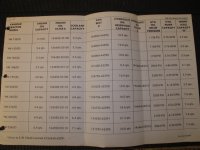I ended up changing it. 303 is getting banned in a few states "to protect the tractor". Not sure how legit this is. Sounds like lobbyists or some sort of business involved in politics to me. Why would the Govt. care about the quality of oil in a tractor tractor?
Oils claiming to meet the old JD 393 spec are becoming banned in some Ag states simply because there is no such thing as a JD 303 spec. anymore. So quoting JD 303 as a specifiction is too often a scam used to sell cheap oil at higher prices. Don't fall for it, there is no governing body that makes sure that the Trans/hydraulic oil at the discount store has any of the qualities of a name brand. I'd agree that the Fed. gov't doesn't care about quality of oil in a tractor, but some farm states have state legislators that do. That's why you see it as a state issue.
That said, the Yanmar hydraulic & power shift system is overbuilt and incrediably rugged. So it will run on just about anything. From the photo posted by 777funk, It looks like his - like many - ran fine for years on a mix of about half motor oil and half water. The milky detergency is the giveaway. That doesn't mean that particular mix is the best thing to run in them.
Running any kind of oil without the water and crud mixed in has to be better. Running a real trans/hydaulic oil is better yet. How far you go down that road sort of depends on how you feel about gambling on repairs.
On sort of the same rant... yes, the hydraulic filter is expensive. There are only really two types of spin on filters: Engine oil type and Hydraulic system type. They are built differently and cost differently because they do different things.
Normal prices for engine oil filters is in the $5.00 to $10.00 range. Hydraulic filters tend to run in the $20 to $40 range. Powershift Yanmars take one of each. And they all take the same one. - see attachment below.
Think about it. Hydraulic filters cost a lot more than engine oil filters because hydraulic systems run at almost 100 times the pressure and at a much higher flow rate (gallons/minute) than the engine oil does. So a hydraulic filter that is built to handle that kind of high pressure and flow rate also costs more to manufacture than an engine oil filter does. The fact that sometimes they have the same number of holes and will thread onto the same fitting means nothing.
It also doesn't mean that using an engine oil filter in a hydraulic system will automatically cause the filter to blow up or shed it's insides....or that doing that will screw the powershift & hydraulic pump if things do go bad.
It might, but probably won't hurt things. Yanmar built a tough system. They tend to just stop working until cleaned. Of course that also means that the hydraulic pumps are cavitating .... but they seem to handle that better than most. Or at least with less erosion to the inside of the pumps.
And even if it does cause problems it will most likely just be a matter of the cleanable filter getting blocked with crud that causes cavitating and eroding of the surfaces of the hydraulic pumps. That's not the end of the world either. New pumps are still available for not too much.
Although it's fair to say that they cost far more than a lifetime of filters and real trans/hydaulic fluid.
One other thing that can happen but rarely does is that chunks of filter material and water-based crud get caught inside the powershift transmission where dozens of tiny flow channels direct the hydraulic flow in the power shift plates - but at worst that 's just a disassembly and reassembly job. Sort of fun to see how it all works anyway.
Good luck beats good planning.....rScotty

